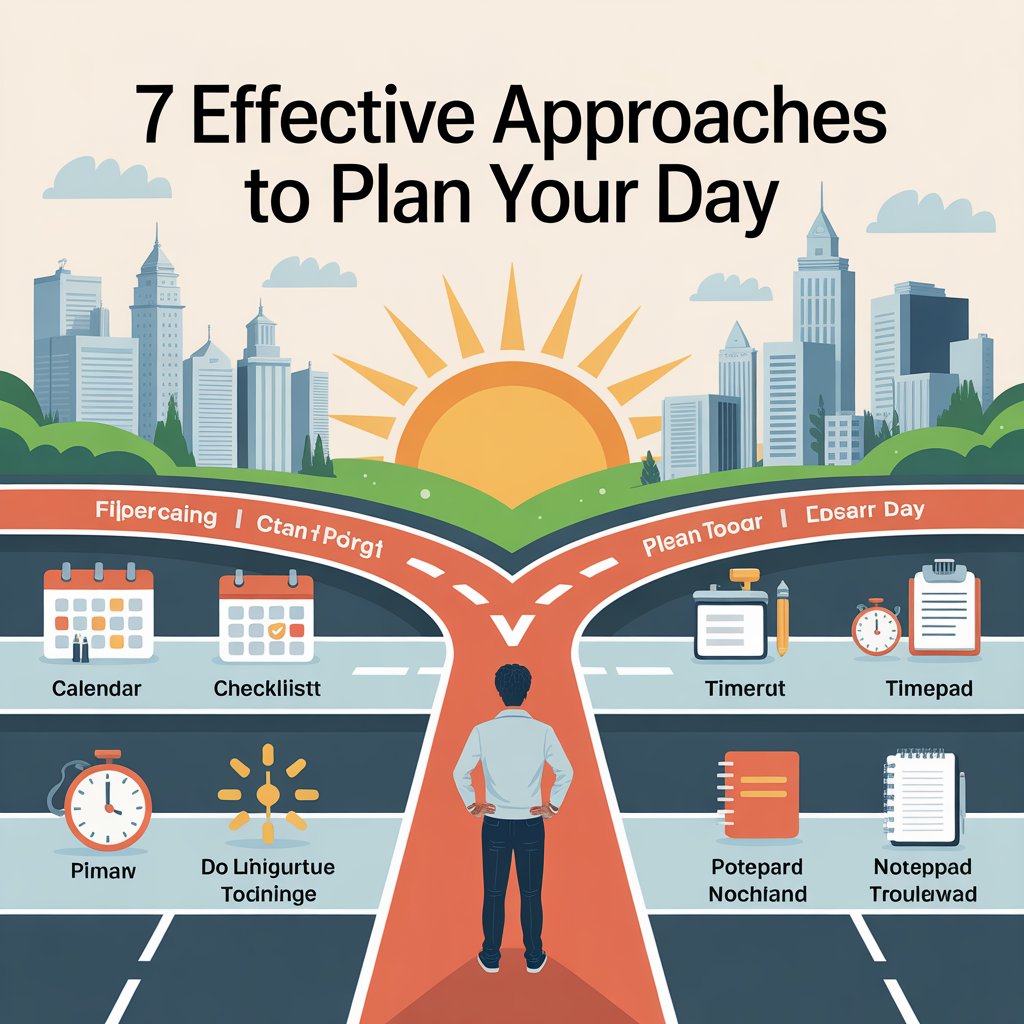In today’s busy world, effectively planning your day can be the difference between feeling overwhelmed and staying productive. Whether you’re juggling work, personal commitments, or both, having a clear plan helps you focus, reduce stress, and accomplish more. Here are seven effective approaches to plan your day, designed to keep you organized and motivated.
Make a To-Do List
Creating a to-do list is one of the simplest yet most effective ways to organize your day. Listing your tasks in writing clears mental clutter and provides a clear snapshot of what you want to accomplish. The power of a to-do list lies in its flexibility, you can tailor it to suit your style, whether it’s a detailed checklist or a broad outline of priorities.
You don’t need to follow the list in order; it serves as a reference to keep important tasks visible and manageable. To-do lists help reduce anxiety by giving your brain a trusted place to store tasks, so you can focus on execution instead of trying to remember everything.
Break It Down
Breaking down larger tasks or projects into smaller, manageable parts is a strategy that makes daunting work feel more approachable. Instead of viewing a big task as a mountain to climb, breaking it into bite-sized chunks lets you focus on individual components that can be tackled one at a time.
This approach works well when you face complex or unfamiliar tasks that can otherwise trigger procrastination. By clarifying exactly what needs to be done in smaller steps, you create clear goals for each session of work, increasing your motivation and sense of progress.
Use a Digital Planner
Digital planners have transformed the way many people organize their day-to-day activities. Unlike traditional paper planners, a digital planner offers enhanced flexibility, easy edits, and the ability to access your schedule on multiple devices like smartphones and tablets. This makes them ideal for those who need to manage busy, dynamic schedules with convenience.
It’s important to find a planning tool that aligns with your specific lifestyle and goals. For those seeking a flexible and accessible way to manage their time, a well-designed digital planner can make a real difference. DigyKeys provides options focused on areas like financial planning, self-care routines, and event organization, all compatible with smartphones and tablets, so staying on track is always within reach.
Using a digital planner can help you centralize your tasks, appointments, and reminders in one place, while also allowing customization to suit your workflow. Whether you prefer detailed daily breakdowns or weekly overviews, digital planners adapt to your style and help maintain your momentum.
Plan for Breaks
Scheduling breaks might sound counterproductive, but it’s an essential part of effective day planning. Regular breaks improve focus, prevent burnout, and boost creativity. Without breaks, mental fatigue can build up quickly, reducing your efficiency and increasing errors.
Planning for breaks means being intentional about stepping away from work at intervals, whether it’s a quick stretch, a walk outside, or a short mindfulness exercise. Approaches like the Pomodoro Technique, which pairs focused work periods with short breaks, illustrate how breaks can improve overall productivity.
By integrating break times into your day’s plan, you give yourself the permission to rest, which in turn helps sustain energy and motivation throughout the day.
Focus on One Task at a Time
The art of single-tasking, or focusing fully on one task at a time, can drastically improve the quality and speed of your work. Multitasking often leads to divided attention and mistakes, while concentrating on a single task helps you enter a flow state where productivity peaks.
This approach encourages prioritizing tasks and giving them your undivided attention, whether it’s writing a report, answering emails, or brainstorming ideas. Time blocking is a technique that pairs well here, allocating dedicated periods for specific tasks to minimize distractions.
Practicing single-tasking not only increases output but also reduces the cognitive load caused by task switching, leaving you feeling less overwhelmed and more accomplished.
Avoid Procrastination
Procrastination can undermine even the best plans. Recognizing and combating procrastination is its own powerful approach to better day planning. Often rooted in fear, uncertainty, or overwhelm, procrastination can be mitigated by adopting strategies that lower the barrier to starting work.
For example, applying the “two-minute rule” encourages you to begin any task that can be done in two minutes or less immediately, preventing small tasks from piling up. Another technique is to set mini-goals or deadlines, which create manageable milestones and a sense of urgency.
Using reminders, accountability partners, or productivity tools can also support you in breaking the procrastination habit. The key is to create an environment and mindset that encourages taking action rather than delaying it.
Reflect and Adjust
Taking time to reflect on how your day went and making adjustments is a crucial, yet often overlooked, approach to planning. Reflection helps you understand what strategies worked well and what challenges arose, providing insight to optimize your planning in the future.
This can be as simple as reviewing completed tasks, noting unfinished work, or journaling about your productivity highs and lows. Over time, reflection builds self-awareness and helps you tailor your planning methods to what suits you best.
Many digital planners include built-in features for journaling or tracking daily reflections, making it easy to incorporate this step regularly. Reflection creates a feedback loop that supports continuous improvement in how you organize your day.
Final Thoughts
There’s no one-size-fits-all solution for planning your day. The best approach depends on your unique preferences, goals, and lifestyle. The seven approaches above offer a diverse toolkit to help you find what works best for you.
Whether you prefer the simplicity of a to-do list, the tech-savvy benefits of a digital planner, or the mindfulness of scheduled breaks and reflection, each method offers distinct benefits. Experimenting with different approaches can help you build a personalized system that maximizes your productivity and wellbeing.
Start with one or two strategies that resonate with you and adjust as needed. Effective daily planning is about creating habits that empower you to navigate your tasks and goals with confidence and clarity.

































